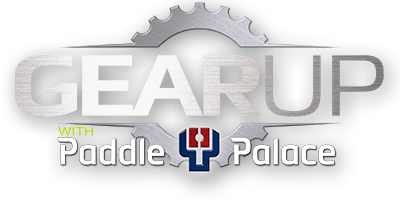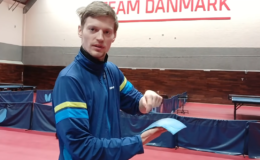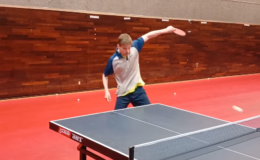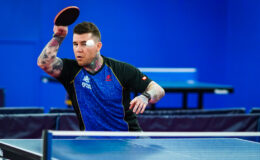By Larry Hodges, USATT Hall of Famer and National Coach
It can be very tough playing well in tournaments after traveling, especially if you cross several time zones. For example, in the U.S., players on the east and west coast sometimes fly 3000 miles to play in the U.S. Open, USA Nationals, or North American Teams Championships. Often they play poorly, especially on the first day, and are frustrated. Sometimes they come back on day two and play well and conveniently “forget” how poorly they played the first day, and so never really figure out how to avoid it in the future.
Travel messes up your sleeping habits, with jet lag leading to fatigue. (So does dry air and varying air pressure, which can also cause nausea, as well as the general hassle of travel.) West coast players playing in east coast tournaments struggle to play effectively at 9AM, which is 6AM their time – meaning they probably had to get up at 4AM. East coast players have little trouble playing at 9AM in west coast tournaments, which is noon to them – but when they start playing in 7PM matches that go on until 9 or 10 PM, well, that’s past midnight for them. Junior players are especially vulnerable to this.
If you travel west to east and don’t have morning matches, or if you travel east to west and don’t have nighttime matches, then you may consider simply sticking with your own time. If you travel west to east, you might want to get something to cover the windows so bright sunshine doesn’t wake you up early and mess up your plans.
Here are some ways to adjust to changing time zones. (Note – I may add more to this article later on, especially if I get good suggestions from others. One interesting thing I learned while doing some online searching is that some people use over-the-counter melatonin as a way to adjust their circadian rhythms and sleep habits – but I don’t really know about this, and there are warnings to consult with a doctor first.)
1) One or two weeks before the tournament start adjusting to the local time of the tournament. Perhaps adjust your schedule by an hour two weeks in advance, another hour a week in advance, and a few days before the tournament you are on tournament local time.
2) Arrive at least two days before your main events begins. In some major tournaments you can get away with arriving the day before if your main event doesn’t start on the first day. In this case the first day is more or less your “warm-up” day – but beware, you might not play well at the start if you only got there the day before, and it’s sometimes difficult to come back from a bad start. If you go to a really major tournament only once or twice a year, perhaps come out two nights in advance, relax and have a little practice the day before (think of it as a vacation day), and by tournament time you are on top of the world, rested and ready to go.
3) Get extra practice at the tournament site the day before. There’s nothing like a good workout to energize the body. Both drills and practice matches are effective. (Don’t do this too late the night before or it might affect your sleep.)
4) If you really feel tired, go to the restroom and splash cold water on your face. It’s a surprisingly simple yet effective tool. I’ve both done it and had students do it for years with surprising success.
For players traveling from East to West:
5) When you first arrive, you may feel like going to bed early local time, since what’s “early” locally is late in your own time zone. Resist the urge. If you go to bed too early, you’ll stay in your own time zone sleeping habits, wake up too early, and if you have matches the following night you may pay the price. Related to this is that many players sleep while traveling to the tournament, making it that much harder to go to sleep at the right time. Unless you are the type who can sleep at any time, avoid too much sleeping while traveling, since it’ll make it harder to sleep later on. (This might be difficult for some, since many do sleep while flying to tournaments.)
6) If you have to play nighttime matches, consider taking an afternoon nap during the tournament. Just a 20-30 minute nap will get you rejuvenated. But make sure to arrange a good practice session afterwards to get the body warmed up again.
7) One surprising solution: bright light a couple hours before the time you would normally go to bed will often change your circadian rhythms, delaying the time you’ll go to sleep and get up, and more quickly get you into local time.
For players traveling from West to East:
8)The big problem here are morning matches. Hopefully you’ve been going by local time before the tournament, at least to an extent. It’s probably more important doing this for west-to-east players, who otherwise will face very difficult early morning matches when their bodies are still half asleep. To help wake up, get some morning exercise. Go out for a jog before breakfast. After breakfast, get to the playing hall early for an exhilarating work-out, with the focus on drills that are physical to get the body thoroughly awake and ready to play. A huge advantage here is multi-ball training, where you can drill very fast without losing control, as often happens when two players try to rally faster than usual. Or play practice matches, which often get a player going more effectively than just drills.
9) When you first get up, expose yourself to bright light. This wakes up the body quickly. To a lesser degree, so does splashing cold water on your face.
10) The temptation will be to stay up late the night before, since the local “late” isn’t so late in your time zone. (This is even more tempting if you sleep while traveling to the tournament.) But if you do that, you’ll pay the price when you have to get up. On the other hand, many people can’t go to bed early; if they try, they’ll just lie awake. But try to find a way. Perhaps go to bed early, but read until you are sleepy, and then go to sleep. Avoid things that will keep you awake in the hours before the time you should go to bed – excessive exercise (try to get this done before dinner time), eating too much too late, alcohol, and caffeine.
Just remember what your goal is when you travel to tournaments: to play well. If you prepare yourself so that you are alert and energetic at the start and finish each day, you’ll probably play well.



